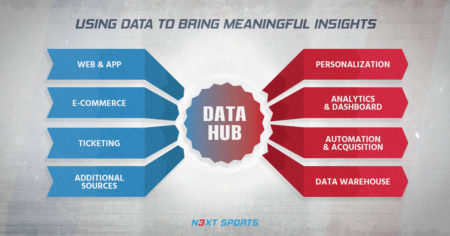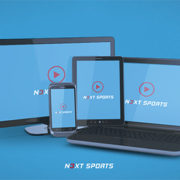Sports organizations follow a market model, responding to demand and supply dynamics. For instance, the number of fans looking to attend a sporting event determines ticket pricing and, in turn, the operational needs at the venue. To plan & execute effectively, they depended on data from previous events. Historically, this data was static and sat in databases that were siloed within the organization. Technology has arrived in the last decade that is changing this model.
Whereas previously, data & data management were not a core function of any organization, today it is part of an increasing number of decisions. Data generated from social media, partner platforms, grassroots operations, and ticketing can now flow into centrally organized and accessed data warehouses. Decision-makers in sports are operating in a changing landscape that rewards nimbleness, agility & innovation. To do so, up-to-date data must be at their fingertips.
However, the abundance of data is not the challenge. To illustrate, almost 90% of the data in the world today was created just in the last two years, according to Forbes.
Rather, leaders now raise the question “All this data, and now what?”
Leaders want to use data as a competitive advantage and have a data- and digitally-fluent culture in the organization. Research shows that data- and digitally-fluent companies outperform their peers and this holds true for the board of directors and middle management. Therefore, the path forward is data transformation. Sports organizations must understand their digital readiness to exploit this opportunity– from structure and flow of data, the use of data by 3rd parties, ownership of that data, the CRM in place, and other important areas.
USING DATA TO BRING MEANINGFUL INSIGHTS
It can be overwhelming for many sports organizations to see the amount and variety of data that flows internally and externally. This is why a data transformation strategy is key. From assessment to user mapping, to user experiences, digital & non-digital data flows, to the technological tools used, the business objectives achieved by data, all these areas compose the strategy. One of the outcomes of such analysis that is increasingly important for our clients are data maps. These are illustrative representations of the data flows within and around an organization. These tools help contextualize data for a strategic conversation beyond tech or IT and be relevant for staff and leadership to plan improvements. One such example is from Bundesliga’s subsidiary Sportec Solutions, which provides technological solutions for Bundesliga’s media value chain.
Some football clubs in France’s Ligue 1 are using their CRM to build a qualified and richly informative database of fan profiles. They do this by tracking the number of tickets purchased, matchday product consumption, demographic and geographic information, etc. This information improves fan loyalty by tailoring communications to these fans. For example, this data can inform the social media team of the most relevant campaigns to run during a specific period thanks to fans’ engagement with content. It can offer new value to sponsors through targeted newsletters or upselling interesting products during a matchday experience.
Sponsors today are interested in deep insights into fan interactions and spending behaviors. Organizations that create a 360-degree view of their fans and have an intricate relationship with them can make personalized sponsorship propositions based on the brand & image of their choice. Empowered with data from these new tools & solutions, commercial teams can negotiate better deals with partners.
Due to the shortened attention span of fans and numerous distractions, industries are adapting by personalizing their products and services. Broadcasting has seen one such change and viewers are now interacting on multiple devices at the same time while watching a sport. In April 2020, NBA in collaboration with Microsoft announced plans for a streaming platform to enhance the game viewing experiences for their fans using artificial intelligence. Each game will be tailored to each fan with a commentator of their choice, virtual advertisements, preferred camera angles and stats in real-time. Incoming data from these interactions can be recorded and analyzed to personalize the communications to each fan. This is powerful in the digital age. According to Salesforce, a global CRM software tool, 63% of millennials will share their data in return for personalized offers and discounts.
Other departments such as sports performance or game analysis can take advantage of data hubs. In 2020, the National Sports Agency of France, INSEP and the Sports Directorate partnered together to create a sport data hub with four main objectives– 1) to improve the preparation and performance of high-level athletes; 2) better analyze competition, 3) optimize the allocation of public resources and 4) facilitate high-performance research programs.
Another way to leverage data hubs is to accelerate internal decisions. During one of our online meetups, Jens Behler, Head of Digital Communications at the German Olympic Sports Confederation (DOSB), stressed the importance of having live data to drive organizational decisions. The DOSB created a social hub inside the company to create content and track data.
Data is the new oil. Thus, sports organizations that have a data-first culture & a clear data transformation strategy to steer the business will develop a sustained competitive advantage in the coming decade.

WHAT'S N3XT?
According to Forrester research, 41% of decision-makers believe accelerating the shift to digital business is their most critical priority. 62% of CEOs have a management initiative or transformation program to make the business more digital. This is the same in the sports industry. The past 3 annual PWC Sport Surveys show leaders continuously prioritizing innovation & digital transformation as the key enablers for their organizations’ future evolution.
As everything becomes digital, the role of technology & data becomes the core business drivers of any organization. More and more, today’s leaders are relying on individuals and teams within organizations who are well versed in the digital & data age. Moving forward, the role of technology and data within sports organizations will become more prominent. In some cases, this is already happening. LaLiga spun off its IT & Tech Development departments into LaLiga Tech this year, to allow it to become an independent business. Organizations like the NBA have launched new roles & departments around data, digital & direct-to-consumer.
COVID-19 has accelerated demand for transformative data & digital services. We are observing a heightened awareness from sports business leaders on the ROI on technology. Now, there is an appetite for agility and nimbleness in tech rather than long programs of digitalization. Digital transformation demands a radical redesign of our clients’ businesses, to enable efficiency and velocity. From a technology-centric focus, there is a shift happening towards business-first outcomes from technology. The gap has widened between businesses with the technical agility to pivot at the pace of evolving consumer demand, and those that failed to modernize ahead of COVID-induced volatility.
This is true for our professional sports clients who serve fans in physical & digital environments, to governing bodies that serve their members & associations to national federations organizing talent development programs for athletes. We are continuously deploying multi-year transformational data & digital projects with our clients to accelerate their business transformation regardless of their sports business objectives.
Are you considering your organization’s data transformation strategy? Make sure to reach out so we can accelerate your journey. Our team of sports & data experts can help you take the first steps and accompany you along the whole journey, from end to end.
Fill out the form below and our team will get in touch!



